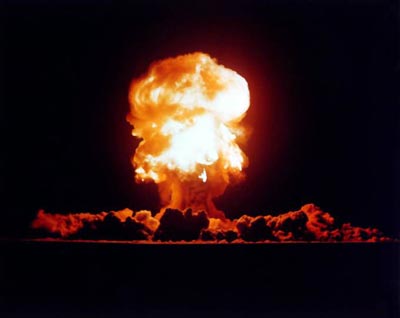When Presidents Medvedev and Obama signed the new arms control treaty, they did it with completely different understandings of what the piece of paper actually means. To the United States, this signifies as a positive signal from Russia, giving us more leverage to convince the other world power to cease aiding Iran with its nuclear pursuits. To Russia, the document signifies further US cutbacks on its missile defense program.
After the formal signing of the treaty, Medvedev made an announcement tying the ratification and progress of the treaty to the United States missile defense system pursuits. He stated that as soon as the United States defense program in any way threatens the security of his country, he reserves the ability to pull out of the treaty.
This is why the treaty will fail. As I have mentioned before, any future nuclear weapons improvement, whether it is in terms of defensive or offensive weapons, will destabilize the current international security. I doubt that the government has current plans of creating a super-nuclear weapon (anything larger than a thermonuclear bomb) or pursuing a clandestine program of increasing our current arsenal, so the most dangerous destabilizing agent is the nuclear defense program.
I am not arguing that we need to forego any nuclear defense programs; we just need to remove its discussion from our foreign policy rhetoric. In fact, no truly successful test of a defense system has yet to be performed. The reiterated success stories are actually recounts of testing done with preset, single warhead missile launches. If some country or nongovernmental group were to launch an attack against the United States, they would most certainly use MIRVed missiles with multiple mylar decoys to mask the location of it. In space, an object of any weight has the same trajectory, so it is difficult to tell which item is a decoy and which an actual warhead without physically changing its course. At first scientists countered this decoy possibility with the addition of radars to kill vehicles (the balloon with the warhead would have a higher temperature and thus a detectable different color). However, decoys can change colors to represent various temperatures in space (since the best time to successfully intercept a nuclear warhead is in its midcourse trajectory). For every solution that we find, the enemy will find a way to circumvent it.
Why is missile defense such an important part of our nuclear foreign policy rhetoric? I blame Reagan. His Strategic Defense Initiative (SDI) planted the idea of successful defense against nuclear weapons in the heads of Americans, and even though the plan was soon terminated, the idea remained. Telling the public that there is no way to protect the U.S. against nuclear weapons would be to suggest the inefficiency of the government, and nobody wants to do that. So we make plans to put defense systems around Europe to contain a possibly nuclear Iran.
This nuclear defense plan, however, will prevent the New START from getting ratified. We have Senators like DeMint that promote the idea of creating a defense system large enough to essentially delegitimize Russia’s arsenal. There are a couple of problems with this.
1. Such a nuclear defense system is currently far from possible
2. The basic fundamentals of nuclear policy prove how idiotic this idea is. Nuclear Defense -> Russia doesn’t have second strike capability -> Russia has incentives to make more weapons than the defense could intercept -> Russia has incentives to attack these defense systems before they are fully constructed -> Conflict -> Dear Senator DeMint, you just destroyed the world.
Yet the United States is set on implementing this defense system that Russia obviously objects to. Currently, Russia is hoping to control the actions of the United States and the strength of the alleged system by constantly threatening to pull out of the treaty. As soon as the US shows that it has no intentions of stopping, the treaty will be null and void. And with people like Senator DeMint in a position of power, all of this will happen.
So, just like START II failed when the United States pulled out of the 1972 Anti-Ballistic Missile Treaty in 2002, so will the New START as soon as the U.S. announces plans for an advanced missile defense system… which, I’m pretty certain, is still a figment of the government’s imagination.
